PM on Latin America | Chch Hospitals | Solid Energy
Post-Cabinet Press Conference - 18 March 2013
By Mark P.
Williams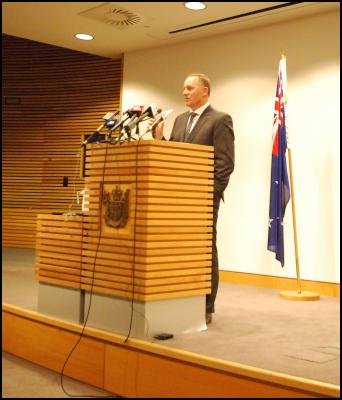
The Prime Minister began today's post-cabinet press conference with a brief recap of his trade visit to Latin America.
He explained that his trip had resulted in 49 business leads for the 22 New Zealand businesses which accompanied him. He spoke particularly about the importance of agreements with Colombia for improving and boosting New Zealand's interests in Latin America and emphasised the significance of FTAs with Colombia for different sectors, specifically mentioning education and manufacturing. The Prime Minister said that "New Zealand's branding in Latin America is strong". He said that Mexico, Colombia and Chile all confirmed their support for New Zealand's bid for a seat on the UN Security Council.
The Prime Minister said that President Santos of Colombia had indicated willingness to negotiate an FTA with New Zealand and the PM said that he was eager to do so as soon as possible. He then said that both Chile and Brazil had signed agreements to increase the number of students from schools up to PhD level studying in New Zealand. He added that the Economic Minister of Chile had announced an extension of the Penguins Without Borders scheme which allows high achieving Chilean students to visit New Zealand for up to six months at a time.
He then
moved on to business closer to home, announcing the dates
for the new Christchurch Hospital to commence in June 2013.
The hospital is due to be completed in 2018 at a cost of
over $600m.
The Prime Minister also announced the visit to New Zealand of the Thai Prime Minister Yingluck Shinawatra this Friday.
Questions to the Prime Minister
The PM was asked what had happened regarding the proposed Car Park tax. He replied that Peter Dunne had sought further advice about the likely compliance costs as well as submissions from the select committee and that it had been decided that the proposed scheme would not be worth undertaking for the amount of revenue generated.
The PM was then asked whether it was embarrassing for him personally — pointing out that Labour had suggested Mr Dunne was being 'hung out to dry'. He disputed this and insisted that it was a policy which had been changed as part of a "normal, standard track" for making changes.
The PM was next asked about the compliance cost of the scheme. He said he was unsure exactly but that indications were that it would not have been the estimated $30m, perhaps only a tenth of that amount but that it was "very subjective".
The PM was asked if the country was going to have the debate over smartphones and laptops all over again. He responded that the government was going through a process of consultation.
It was put to the PM that businesses found "little taxes" coming on "here and there" disruptive and they wanted a "simple system". The PM responded that New Zealand has a very simple system: broad base, low rate and that IRD's main priority was actually about fairness. He said that the government was "constantly changing that mix" of taxes.
The PM was asked if there were any political considerations prominent in this decision; the PM was reminded about his own stance in 2005 when he said that he would not be part of a government which raised this. He responded that his statement was made three elections and nearly nine years ago and that in opposition Ministers do not have access to all the information that government's do.
The PM was asked what he thought of the Auckland Council's draft unitary plan and whether it would do the job of addressing Auckland's housing issues. He said that it would help but he was sceptical about the extent of its benefits. He said that the issue was the Council seeking to fast-track it where the government wanted more time for community contact.
The PM was asked whether he shared the Reserve Bank Governor's concern that New Zealand might be facing a "housing bubble". He responded that it was necessary to "take a step back" and ask why New Zealand has seen house prices rise faster than expected. He continued that he believed it to be a combination of different factors stemming from lack of supply and lack of investment caused by the financial crash. He added that the government needs to look at "all the levers" available to it to address a possible housing "bubble"
The PM was then asked to clarify if that mean that his government would make sure that it used the prudential tools to prevent a housing bubble scenario developing. He responded by saying that the Reserve Bank Governor was addressing that at the moment. He added "we've seen those types of controls before and there's always ways of getting around them", emphasising the importance of finding measures and controls that would have the desired effect.
The PM was then asked whether that meant that he was worried that banks would try and "get around" such controls. He responded that "it's always possible" and the Reserve Bank Governor needs to test how likely it is that his proposed measures will work.
The PM was asked whether he would limit loan to value ratio. He responded that if it was the recommendation which resulted from the Reserve Bank Governor's analysis that the National government would "look very, very closely at it".
On the matter of Solid Energy, the PM was asked if anything would come out in terms of documentation which would indicate strong differences of opinion between the Solid Energy Board and the government when what has emerged so far seems to show the government and the board in agreement. The PM disagreed that this was correct and said that the documents released on Friday already indicated significant disagreements.
The PM was pressed as to whether further documents would be published. The PM was uncertain as to how much was likely to be made public but indicated that he thought it likely that more would be published.
The PM was asked why New Zealanders could not have an independent inquiry. The PM responded that he was not sure it would achieve a lot. He added that most of the reasons for the company's collapse were well documented.
It was put to the PM that Solid Energy seemed to have been working with a "pretty high-risk" strategy. He responded by saying that all of these things were operational matters — he added that "if National's to blame, then so's Labour". He said that the management and the board are responsible for the balance-sheet.
The PM was asked about the scoping study and its impact on decision making. He said that it was the case that the government put a lot more credence on the scoping study than the board of Solid Energy did.
The PM was asked how much Solid Energy affected the government's anticipated $5-7bn from the partial float of SOEs. He said that the scoping study had always mean that Solid Energy would not be "at the front of the queue" for the Mixed Ownership model. He said it was important to remember the sequence of events between early 2011 and now, saying it is still very unclear whether the government would achieve its target figure or not.
The PM was asked what month he received the scoping study for Solid Energy. He responded that he was not sure and would have to check with his office.
The PM was asked whether the government might have to cut spending to reach its targeted surplus in 2014/15 in light of the cost caused by the current drought. He responded that the projected figures were quite subjective at the moment and it was too early to tell. He further emphasised that the costs of the drought might be offset by other revenues from other sectors of the economy.
The PM was asked if he would know before the budget. He responded that the government ought to know before the budget but that it was not a consideration for the budget at present.
The PM was asked if the government was any closer to an emissions target for 2020 yet. He responded that they were not as yet.
The PM was asked about Tim Grosser's bid to become Director-General of the World Trade Organisation. He stated his support for Mr Grosser as the best person for the job but tempered it by emphasising that he was up against seven other strong candidates.
The
PM was asked if Cabinet had discussed Novopay and whether
there had been any decisions made about whether or not to
keep the system. He responded that it had been discussed
and that Minister Joyce should be in a position to make an
announcement this week.
The PM was asked about the Christchurch Hospital plan and whether he was able to say what the plans were for Princess Margaret Hospital. He said he was not and that it was something to ask Minister Tony Ryall.
Click a link to play audio (or right-click to
download) in either
MP3 format or in OGG format.
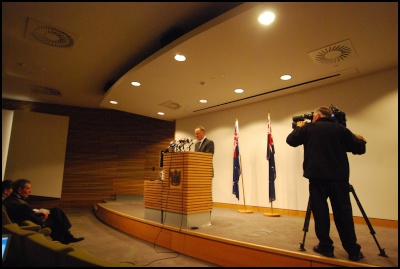
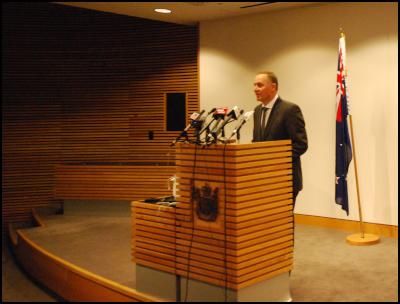
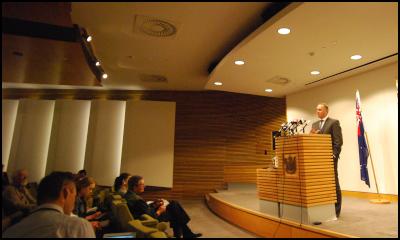
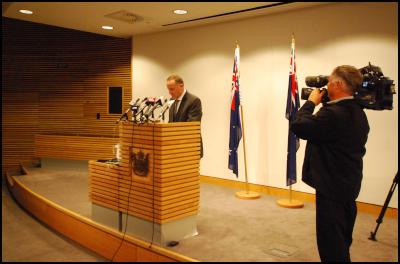
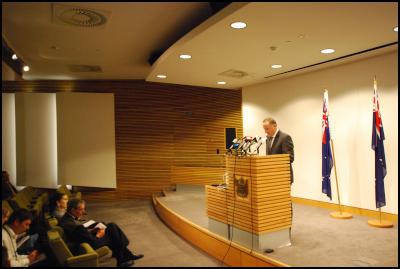
Click for big version.



 Binoy Kampmark: Commemorating Mummy - Reflections On Mother’s Day
Binoy Kampmark: Commemorating Mummy - Reflections On Mother’s Day Gordon Campbell: On The New Pope, And The Israeli Attack On Peter Davis
Gordon Campbell: On The New Pope, And The Israeli Attack On Peter Davis Martin LeFevre - Meditations: For The Love Of Sycamores
Martin LeFevre - Meditations: For The Love Of Sycamores Ian Powell: A Timely Call For A Social Contract In Health
Ian Powell: A Timely Call For A Social Contract In Health Binoy Kampmark: Bratty Royal - Prince Harry And Bespoke Security Protection
Binoy Kampmark: Bratty Royal - Prince Harry And Bespoke Security Protection Keith Rankin: Make Deficits Great Again - Maintaining A Pragmatic Balance
Keith Rankin: Make Deficits Great Again - Maintaining A Pragmatic Balance